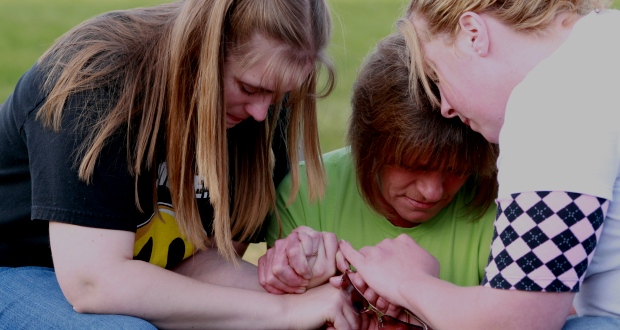We Have Lost A Sense Of Sin

[simpleazon-image align=”left” asin=”0972844767″ locale=”us” height=”375″ src=”http://ecx.images-amazon.com/images/I/51GR5HDeeZL.jpg” width=”260″]We are well into the first week of Lent and you will notice there is a common theme in the readings at Holy Mass – it is repentance. There is the familiar song of “Come back to me”, turn away from sin, repent. But herein lies the challenge; the gods of this world have blinded many of us of our sinfulness and as such, we hear these words and they mean little or nothing to us. Many are caught up in “secret” sin and they think it is all right. After all, nobody knows about it, right.
There is also a very heavy push by the media to desensitize us about sin and about what is right and what is wrong. This is very obvious by the so-called “music” that is being produced now. Their messages used to be secretive before, but not anymore. Messages of violence, drugs, obscenities, pornography and all that is sinful are openly sung about. Here in Trinidad and Tobago, the topic of choice for many of our soca artists is the woman’s “bumper” and wining displayed in utter vulgarity. Our carnival celebration has moved away from creativity to a big parade of bikinis, “G” strings and nakedness enshroud in displays of total abandonment, vulgarity and decadence.
There has also been an attack on our children as very many of the television programs and movies classified for children have lost all sense of innocence. They are enshroud in darkness, witchcraft and sorcery. What was once know to be ugly are now being presented to our children as good and acceptable, and many parents allow these things in the form of toys, games, movies etc. into their homes for their children. Many have literally outsourced their children to the powers of darkness. So from a very early age, the consciences of our children are malformed. Even though many of our children have been through the confirmation program and have been confirmed, they do not know God and do not recognize the things of God. In many instances, there is an outright rejection of the things of God.
Many parents have allowed their homes to be transformed into brothels allowing our sons and daughters to have their girlfriends and boyfriends sleep over – in their children’s room! Children are allowed to demand that parents do not enter “their room:” because it is their “private space”! As such, much sin and darkness abides under the roof of many people and they are in many instances, completely unaware of it.
We have lost our way. We have lost a sense of what is right from wrong. Our senses have become dull. We no longer feel compassion any more. Here in Trinidad and Tobago, we have become so desensitized towards the crime and violence in our society, that when someone is killed, it is just a figure.
Blessed John Paul II wrote an Apostolic Exaltation back in 1984 entitled “Reconciliation And Penance” and in it he spoke in detail about the loss of the sense of sin. Below is an except from this letter.
The Loss of the Sense of Sin
Over the course of generations, the Christian mind has gained from the Gospel as it is read in the ecclesial community a fine sensitivity and an acute perception of the seeds of death contained in sin, as well as a sensitivity and an acuteness of perception for identifying them in the thousand guises under which sin shows itself. This is what is commonly called the sense of sin.
This sense is rooted in man’s moral conscience and is as it were its thermometer. It is linked to the sense of God, since it derives from man’s conscious relationship with God as his Creator, Lord and Father. Hence, just as it is impossible to eradicate completely the sense of God or to silence the conscience completely, so the sense of sin is never completely eliminated.
Nevertheless, it happens not infrequently in history, for more or less lengthy periods and under the influence of many different factors, that the moral conscience of many people becomes seriously clouded. “Have we the right idea of conscience?”-I asked two years ago in an address to the faithful” Is it not true that modern man is threatened by an eclipse of conscience? By a deformation of conscience? By a numbness or ‘deadening’ of conscience,” Too many signs indicate that such an eclipse exists in our time. This is all the more disturbing in that conscience, defined by the council as “the most secret core and sanctuary of a man,” is “strictly related to human freedom…. For this reason conscience, to a great extent, constitutes the basis of man’s interior dignity and, at the same time, of his relationship to God.” It is inevitable therefore that in this situation there is an obscuring also of the sense of sin, which is closely connected with the moral conscience, the search for truth and the desire to make a responsible use of freedom. When the conscience is weakened the sense of God is also obscured, and as a result, with the loss of this decisive inner point of reference, the sense of sin is lost. This explains why my predecessor Pius XI, one day declared, in words that have almost become proverbial, that “the sin of the century is the loss of the sense of sin.”
Why has this happened in our time. A glance at certain aspects of contemporary culture can help us to understand the progressive weakening of the sense of sin, precisely because of the crisis of conscience and crisis of the sense of God already mentioned.
“Secularism” is by nature and definition a movement of ideas and behavior which advocates a humanism totally without God, completely centered upon the cult of action and production and caught up in the heady enthusiasm of consumerism and pleasure seeking, unconcerned with the danger of “losing one’s soul.” This secularism cannot but undermine the sense of sin. At the very most, sin will be reduced to what offends man. But it is precisely here that we are faced with the bitter experience which I already alluded to in my first encyclical namely, that man can build a world without God, but this world will end by turning against him.” In fact, God is the origin and the supreme end of man, and man carries in himself a divine seed. Hence it is the reality of God that reveals and illustrates the mystery of man. It is therefore vain to hope that there will take root a sense of sin against man and against human values, if there is no sense of offense against God, namely the true sense of sin.
Another reason for the disappearance of the sense of sin in contemporary society is to be found in the errors made in evaluating certain findings of the human sciences. Thus on the basis of certain affirmations of psychology, concern to avoid creating feelings of guilt or to place limits on freedom leads to a refusal ever to admit any shortcoming. Through an undue extrapolation of the criteria of the science of sociology, it finally happens-as I have already said-that all failings are blamed upon society, and the individual is declared innocent of them. Again, a certain cultural anthropology so emphasizes the undeniable environmental and historical conditioning and influences which act upon man, that it reduces his responsibility to the point of not acknowledging his ability to perform truly human acts and therefore his ability to sin.
The sense of sin also easily declines as a result of a system of ethics deriving from a certain historical relativism. This may take the form of an ethical system which relativizes the moral norm, denying its absolute and unconditional value, and as a consequence denying that there can be intrinsically illicit acts independent of the circumstances in which they are performed by the subject. Herein lies a real “overthrowing and downfall of moral values,” and “the problem is not so much one of ignorance of Christian ethics,” but ignorance “rather of the meaning, foundations and criteria of the moral attitude.” Another effect of this ethical turning upside down is always such an attenuation of the notion of sin as almost to reach the point of saying that sin does exist, but no one knows who commits it.
Finally the sense of sin disappears when-as can happen in the education of youth, in the mass media and even in education within the family-it is wrongly identified with a morbid feeling of guilt or with the mere transgression of legal norms and precepts.
The loss of the sense of sin is thus a form or consequence of the denial of God: not only in the form of atheism but also in the form of secularism. If sin is the breaking, off of one’s filial relationship to God in order to situate one’s life outside of obedience to him, then to sin is not merely to deny God. To sin is also to live as if he did not exist, to eliminate him from one’s daily life. A model of society which is mutilated or distorted in one sense or another, as is often encouraged by the mass media, greatly favors the gradual loss of the sense of sin. In such a situation the obscuring or weakening of the sense of sin comes from several sources: from a rejection of any reference to the transcendent in the name of the individual’s aspiration to personal independence; from acceptance of ethical models imposed by general consensus and behavior, even when condemned by the individual conscience; from the tragic social and economic conditions that oppress a great part of humanity, causing a tendency to see errors and faults only in the context of society; finally and especially, from the obscuring of the notion of God’s fatherhood and dominion over man’s life.
[simpleazon-image align=”right” asin=”1928832296″ locale=”us” height=”375″ src=”http://ecx.images-amazon.com/images/I/51AJbWboJQL.jpg” width=”261″]Even in the field of the thought and life of the church certain trends inevitably favor the decline of the sense of sin. For example, some are inclined to replace exaggerated attitudes of the past with other exaggerations: From seeing sin everywhere they pass to not recognizing it anywhere; from too much emphasis on the fear of eternal punishment they pass to preaching a love of God that excludes any punishment deserved by sin; from severity in trying to correct erroneous consciences they pass to a kind of respect for conscience which excludes the duty of telling the truth. And should it not be added that the confusion caused in the consciences of many of the faithful by differences of opinions and teachings in theology, preaching, catechesis and spiritual direction on serious and delicate questions of Christian morals ends by diminishing the true sense of sin almost to the point of eliminating it altogether? Nor can certain deficiencies in the practice of sacramental penance be overlooked. These include the tendency to obscure the ecclesial significance of sin and of conversion and to reduce them to merely personal matters; or vice versa, the tendency to nullify the personal value of good and evil and to consider only their community dimension. There also exists the danger, never totally eliminated, of routine ritualism that deprives the sacrament of its full significance and formative effectiveness.
The restoration of a proper sense of sin is the first way of facing the grave spiritual crisis looming over man today. But the sense of sin can only be restored through a clear reminder of the unchangeable principles of reason and faith which the moral teaching of the church has always upheld.
There are good grounds for hoping that a healthy sense of sin will once again flourish, especially in the Christian world and in the church. This will be aided by sound catechetics, illuminated by the biblical theology of the covenant, by an attentive listening and trustful openness to the magisterium of the church, which; never ceases to enlighten consciences, and by an ever more careful practice of the sacrament of penance.
Conclusion
How do we get out of this mess? The Holy Catholic Church presents us with the season of Lent each Liturgical Year so that we can focus on that aspect of our being – of our lives – that reject God. Through the season of Lent, GOD of all Creation, GOD who made heaven and earth pleads with us to, “Come back to me with your whole heart, with fasting, and weeping, and mourning; Rend your hearts, not your garments, and return to the LORD, your God. For gracious and merciful is he, slow to anger, rich in kindness, and relenting in punishment. Perhaps he will again relent and leave behind him a blessing, Offerings and libations for the LORD, your God.”
Therein lies our blueprint, our map out of the mess we have found ourselves, and the love of GOD is so great that not only is HE there at the end of the road, but HE is also present along the road guiding us, bandaging our wounds, shepherding us, carrying us on HIS shoulders – if we but let HIM.
Return to the LORD sister. Return to the LORD brother. Child, return to the LORD with all your heart. Go to the sacrament of reconciliation. Confess your sins. There you will find MERCY.






